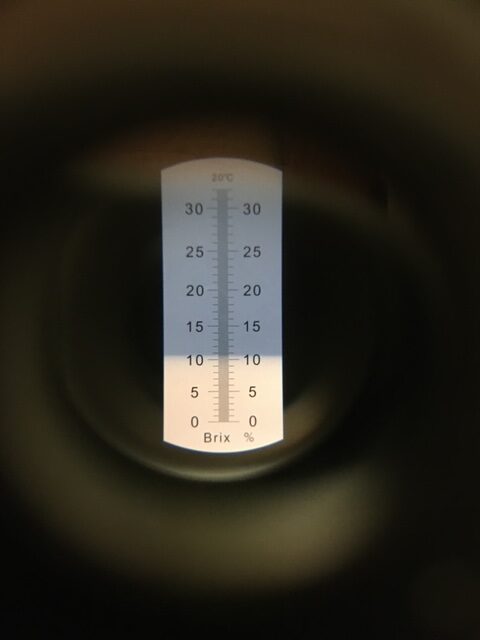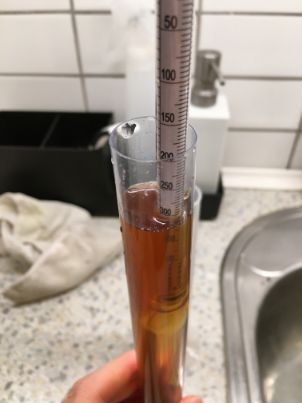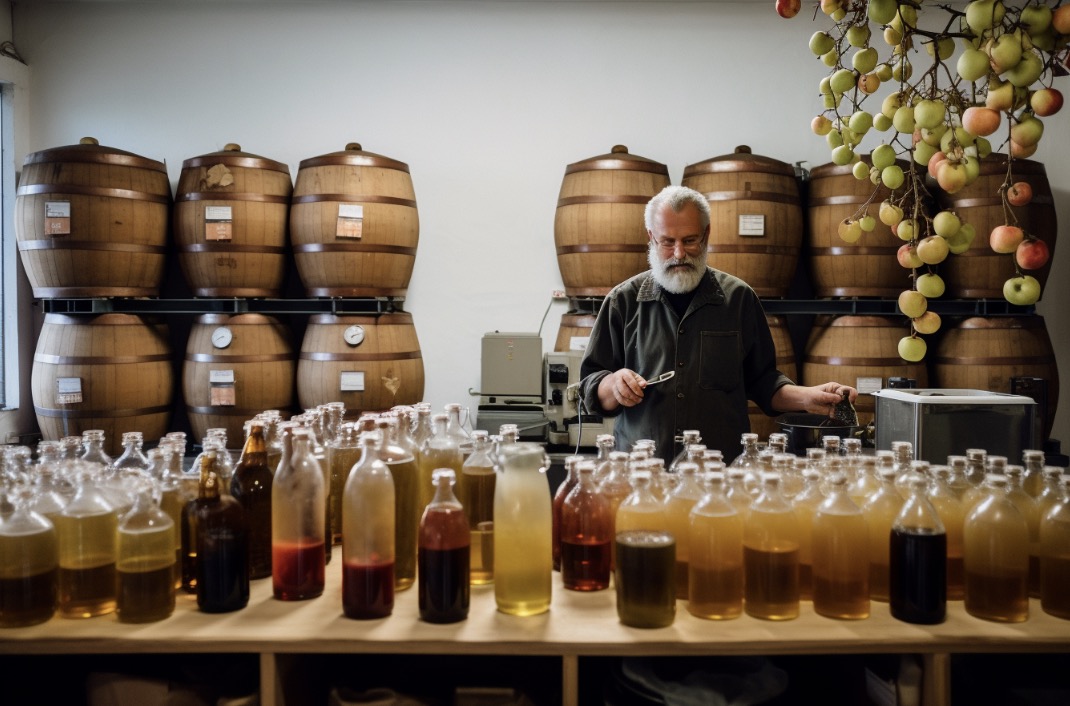When it comes to brewing, one of the most important aspects is accurately measuring the sugar content of your wort and finished beer. This is crucial for determining the alcohol content and ensuring a consistent product.
The two most popular tools for measuring sugar content in brewing are the refractometer and the hydrometer.
But which one is better for your brewing needs? In this blog post, we will compare the refractometer vs hydrometer for brewing, discussing the pros and cons of each, and ultimately help you decide which instrument is best suited for your homebrewing needs.
The main difference between a refractometer and a hydrometer is how they measure the sugar content in your wort or beer. A refractometer measures the refractive index of a liquid, while a hydrometer measures the density of a liquid relative to water.
Both tools can be used to measure the sugar content in brewing, but each has its own set of advantages and disadvantages.
Why use a refractometer over a hydrometer?
Refractometers offer several advantages over hydrometers for measuring the concentration of a solution. Firstly, refractometers require only a small sample size, typically a few drops, while hydrometers need a larger volume.
Secondly, refractometers provide more accurate and precise measurements since they rely on the principle of light refraction, which is less affected by temperature and other external factors.
Additionally, refractometers offer a quicker and easier reading process, as they provide a direct numerical value without the need for complex calculations.
Overall, refractometers are a more efficient and reliable tool for measuring concentration in various applications, such as in the food and beverage industry, chemistry, and brewing.
More on Refractometers
How Does a Refractometer Work?
A refractometer is a small, handheld device that measures the refractive index of a liquid. The refractive index is the degree to which light is bent as it passes through a substance.
The more dissolved solids (such as sugar) there are in a liquid, the greater the degree of light bending, and the higher the refractive index.
By measuring this, a refractometer can provide an estimate of the sugar content in your juice, wort or fermenting beer.

Wheres all refractometers measure using light, they are not all analog and some digital versions read automatically in a matter of seconds.
Advantages of Using a Refractometer
There are several benefits to using a refractometer for brewing:
1. Small sample size: A refractometer only requires a few drops of liquid to take a measurement, which means less waste and a lower risk of contamination.
2. Speed: A refractometer provides near-instantaneous readings, allowing for quicker adjustments during the brewing process.
3. Ease of use: Using a refractometer is simple and requires minimal equipment. Simply place a few drops of liquid on the device’s lens, close the cover, and look through the eyepiece to read the measurement.
4. Durability: Refractometers are generally more durable than hydrometers, as they do not contain any fragile glass components.
Disadvantages of Using a Refractometer
However, there are also some drawbacks to using a refractometer for brewing:
1. Accuracy: Refractometers can be more accurate than hydrometers, especially when measuring the sugar content of finished beer. Alcohol can interfere with the refractive index, leading to inaccurate readings but alcohol also interfers with the density of the brew. In addition, the tiny amounts of CO2 bubbles that are present at the end of fermentation will “lift” the hydrometer slightly, leading to skewed readings.
There are correction formulas available, but they may not be perfect for every situation.
2. Cost: Refractometers are generally more expensive than hydrometers.
What is a Hydrometer?
How Does a Hydrometer Work?
A hydrometer is a glass instrument that measures the density of a liquid relative to water. It consists of a graduated scale and a weighted bulb at the bottom, which causes the hydrometer to float in the liquid.
The more sugar there is in the liquid, the denser it is, and the higher the hydrometer will float. By reading the scale at the liquid’s surface, you can determine the specific gravity of the liquid and estimate its sugar content.

Advantages of Using a Hydrometer
There are several benefits to using a hydrometer for brewing:
1. Accuracy: Hydrometers are generally more accurate than refractometers, especially when measuring the sugar content of finished beer. They are not affected by the presence of alcohol in the same way that refractometers are.
2. Cost: Hydrometers are typically less expensive than refractometers, making them more accessible for homebrewers on a budget.
Disadvantages of Using a Hydrometer
However, there are also some drawbacks to using a hydrometer for brewing:
1. Sample size: A hydrometer requires a larger sample of liquid to take a measurement, which can result in more waste and a higher risk of contamination.
2. Speed: Taking a hydrometer reading can be more time-consuming than using a refractometer, as you need to wait for the hydrometer to settle and stabilize in the liquid before reading the scale.
3. Ease of use: Using a hydrometer requires additional equipment, such as a testing jar, and can be more challenging to read accurately, especially for those with poor eyesight.
4. Durability: Hydrometers are made of glass and can be fragile, making them more prone to breakage than refractometers.
Refractometer vs Hydrometer: Which is Better for Brewing?
Ultimately, the choice between a refractometer and a hydrometer for brewing comes down to your personal preferences and needs as a brewer. Both instruments have their advantages and disadvantages, and each can provide accurate sugar content measurements when used correctly.
If you prioritize speed, ease of use, and durability, and you’re willing to invest in a more expensive instrument, a refractometer may be the better choice for you. However, if you’re looking for a more affordable option and value accuracy over convenience, a hydrometer may be the way to go.
Conclusion
In conclusion, both refractometers and hydrometers have their place in the brewing process, and the best choice for you will depend on your personal preferences and needs. Here’s a quick recap of the key points to consider when choosing between a refractometer and a hydrometer for brewing:
1. Refractometers measure the refractive index of a liquid, while hydrometers measure its density relative to water.
2. Refractometers require a smaller sample size and provide faster readings than hydrometers.
3. Hydrometers are generally more accurate when measuring the sugar content of finished beer, as they are not affected by the presence of alcohol.
4. Refractometers are more durable and easier to use than hydrometers.
5. Hydrometers are typically less expensive than refractometers.
6. When using a refractometer, be aware of the potential for inaccurate readings due to the presence of alcohol and consider using correction formulas.
7. When using a hydrometer, ensure you have the necessary additional equipment, such as a testing jar, and be mindful of the fragile nature of the glass instrument.
8. Ultimately, the best choice for your brewing needs will depend on your personal preferences, budget, and the importance you place on accuracy, speed, and ease of use.
Happy brewing!
FAQs
Why is refractometer better than a hydrometer?
A refractometer is generally considered better than a hydrometer for measuring the specific gravity of liquids, such as in the case of measuring the sugar content in a solution. This is because a refractometer provides more accurate and precise readings compared to a hydrometer. Additionally, a refractometer requires a smaller sample size and provides results quickly, while a hydrometer requires a larger sample and takes more time to settle and read.
Is refractometer more accurate?
Yes, refractometers are generally considered more accurate than other methods of measuring the refractive index of a substance. They provide precise and reliable measurements, particularly for liquids, and are commonly used in various industries such as food and beverage, pharmaceuticals, and gemology.
What is the major disadvantage of refractometer?
The major disadvantage of refractometers is that they are typically limited to measuring the refractive index of transparent substances. They may not be suitable for opaque or highly turbid samples.
Do I need a hydrometer or a refractometer?
Both a hydrometer and a refractometer serve the purpose of measuring the specific gravity or sugar content of liquids. However, the choice between the two depends on your specific needs.
A hydrometer is a simple and inexpensive tool that measures the specific gravity by floating in the liquid. It is commonly used in brewing and winemaking. Hydrometers are generally accurate but can be affected by temperature variations.
On the other hand, a refractometer measures the refractive index of a liquid, which can be converted to estimate sugar content. Refractometers are more precise and require only a few drops of liquid to provide a reading. They are widely used in the food industry and are also suitable for home brewing and gardening.
In summary, if you require a quick and cost-effective measurement for brewing or winemaking, a hydrometer is a good choice. However, if you need higher accuracy and versatility, a refractometer would be a better option.
Can you always use a refractometer instead of a hydrometer?
Yes, a refractometer can be used as an alternative to a hydrometer for measuring the specific gravity of liquids. Refractometers are especially useful for measuring the specific gravity of liquids with low sugar content, such as beer or wine, as they provide more accurate and precise readings. However, it’s important to note that refractometers are not suitable for measuring the specific gravity of liquids that contain substances other than sugar, such as salt or alcohol. In such cases, a hydrometer would be a better choice.




